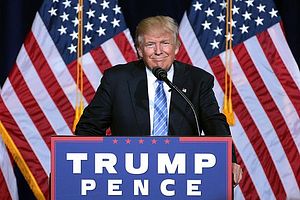There were many lunges and parries during the third and final U.S. presidential debate on October 20, including a few flicks and cuts regarding Asia, but there was an absence of blade when it came to China — save Hillary Clinton’s mention of forced abortions and Donald Trump’s lament for American manufacturing.
“We’re not making things anymore, relatively speaking,” said Trump, “our product is pouring in from China, pouring in from Vietnam, pouring in from all over the world.”
Trump has hammered this point home throughout his campaign and has even gone so far as to say, at a rally in Indiana in May, “We can’t continue to allow China to rape our country.” Yet he’s one of the people holding the door open, which Clinton pointed out during the debate when she noted China’s “illegal dumping of steel and aluminum” into U.S. markets and Trump’s penchant for snapping these products up.
A Newsweek investigation published this month proves Clinton is right on the money, because for two of his three most recent projects, Trump International Hotel Las Vegas and Trump International Hotel and Tower in Chicago, Tump’s steel and aluminum came from China. Newsweek concludes, “He filled his bank accounts with millions of dollars that could have gone to blue-collar workers, many of whom now believe he is the man who will bring back the jobs that he secretly helped to destroy.”
Trump privately uses China for low-cost country sourcing while publicly flogging China for being a low-cost country source. Clinton, meanwhile, is the author of the “pivot to Asia” yet also one of the greatest critics of China’s human rights abuses. It’s therefore understandable if some Chinese are puzzled as to which of these candidates is best for China. Even in America, many speak of the race in terms akin to David Chang’s saltiness paradox. That is, a struggle to find the balance between two equally unappealing options. Personally, I don’t subscribe to that point of view.
Sure, Beijing has already begun to wave the bloody shirt and in The New Yorker this week, Jiayang Fan writes that the presidential race is killing China’s faith in democracy, with one person calling it a “meaningless … method of raping the people.” But Fan cuts to the quick, writing that just as Trump’s lies and non sequiturs distract from his incompetence, China’s criticism of the American election distracts “from its singularly oppressive rule.”
Chinese are fooling themselves if they think the difference between a single-party socialist republic and a two-party federal republic is six of one, half a dozen of the other and that the whole thing is a push.
“In an election rife with false equivalences,” Fan continues, “it is useful to remember that heedlessly comparing unwrinkled authoritarianism to imperfect representative rule is a perversion akin to Trump’s own manipulation of facts and exploitation of fear.” Repugnant though he is, Trump is a beast in a cage. Xi Jinping, on the other hand, may not be as powerful as he seems, but he’s more powerful than Mao ever was because although he rules with less authority, he’s captain of a vastly mightier ship.
The Chinese political system may not allow for someone as absurd as Trump is, but the system itself already embodies much of what he represents, as noted by Robert Kelly, associate professor of international relations at South Korea’s Pusan National University:
“Mercantilism, race nationalism, hostility to immigration, huge distrust of Islam, oligopolistic mega-corporations dominated by interlocking family and crony networks, soft authoritarianism, manipulating the state to benefit politically-connected insiders, golf – that’s Trumpism. But it’s also the de facto governing ideology of contemporary Sinic-Confucian East Asia.”
So when Chinese sneer at American democracy and consider themselves lucky not to have to suffer someone like Trump, what they’re missing is that they already do.

































